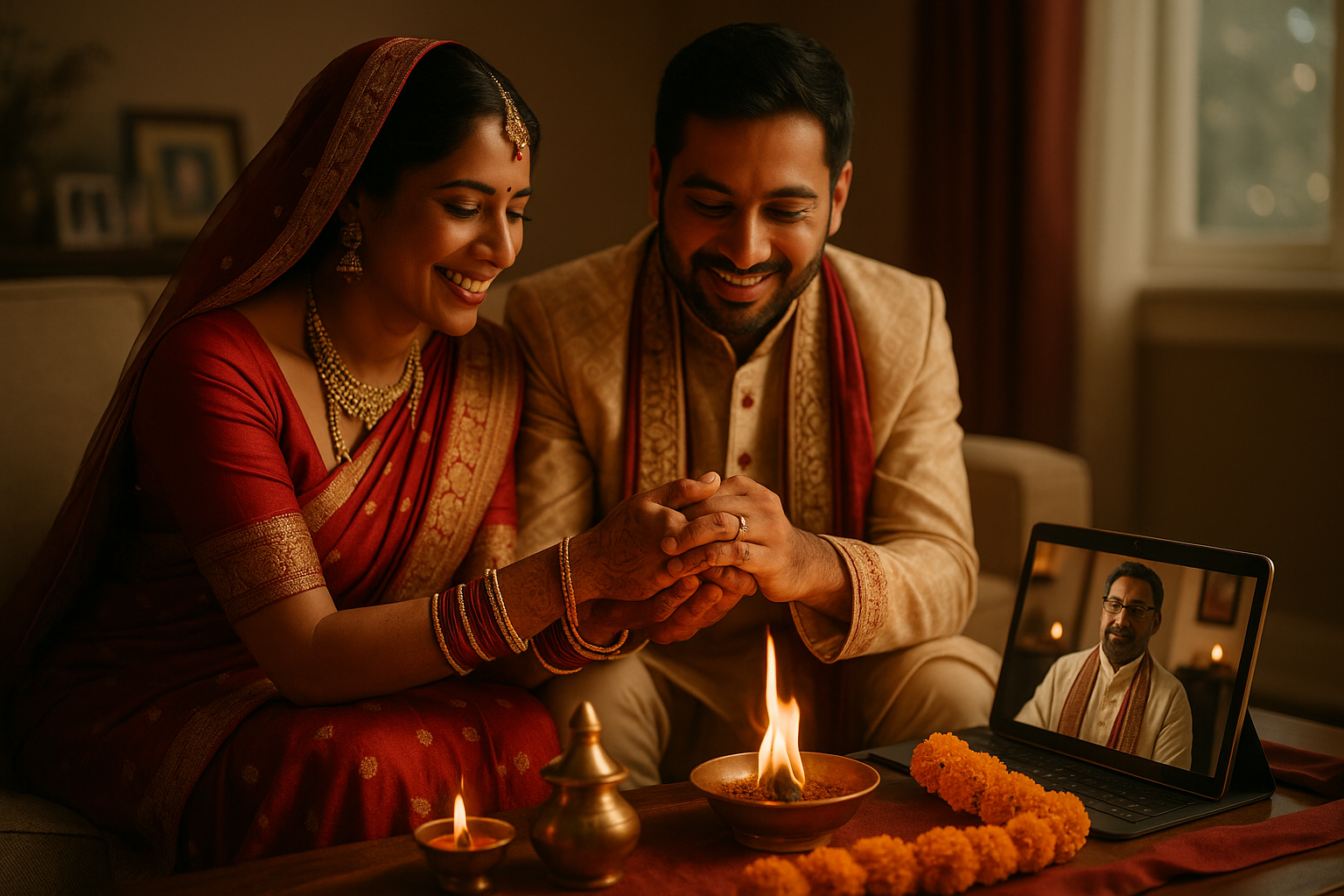In today’s digital age, couples are increasingly exploring the possibility of hosting their Hindu wedding ceremonies online. This approach not only bridges geographical distances but also offers a unique blend of tradition and modernity. Let’s delve into how you can successfully plan and execute a virtual Hindu wedding ceremony.
Understanding the Essence of a Hindu Wedding
A Hindu wedding, or ‘Vivaha’, is a sacred union that encompasses various rituals symbolizing the commitment and spiritual bond between the couple. Key ceremonies include the ‘Kanyadaan’ (giving away of the bride), ‘Panigrahana’ (holding hands near the fire), and ‘Saptapadi’ (seven steps around the sacred fire). Each ritual holds profound significance, and adapting them to a virtual format requires thoughtful planning.
Can You Get Married Online?
Yes, it’s possible to get married online. Services like Courtly facilitate legally binding online marriages recognized in over 150 countries. They offer personalized experiences, legal documentation support, and the flexibility to host your wedding from anywhere in the world.
Incorporating Traditional Rituals Virtually
While the physical presence of a sacred fire (‘Agni’) is central to Hindu weddings, virtual ceremonies can adapt by having a small fire at each participant’s location or using a symbolic representation. The ‘Saptapadi’ can be performed with the couple taking seven steps in their respective locations, synchronized via video call. It’s essential to consult with a knowledgeable priest who can guide the adaptation of these rituals to a virtual format.
Engaging a Virtual Officiant
Engaging an experienced Hindu priest who is comfortable with virtual platforms is crucial. They can ensure that the rituals are performed correctly and maintain their spiritual significance. Platforms like Great Officiants offer modern Hindu ceremonies that blend traditional aspects with contemporary elements, suitable for virtual settings.
Coordinating with Guests and Family
Clear communication with guests is vital for a successful virtual wedding. Provide detailed instructions on how to join the ceremony, the schedule of events, and any cultural practices they should be aware of. This ensures that everyone feels included and can participate meaningfully.
Legal Considerations and Documentation
Ensure that your online marriage is legally recognized by obtaining the necessary marriage license and certificates. Services like Courtly assist with legal documentation and can guide you through the process to ensure compliance with legal requirements.
Personalizing Your Virtual Ceremony
Personal touches make your virtual wedding memorable. Incorporate elements like personalized vows, a curated playlist of traditional and favorite songs, and interactive segments where guests can share their blessings and messages.
Technical Setup and Support
A stable internet connection, quality audio-visual equipment, and a reliable streaming platform are essential for a smooth virtual ceremony. Conduct multiple test runs to address any technical issues beforehand. Having a dedicated technical support person during the event can alleviate potential problems.
Post-Ceremony Celebrations
After the main ceremony, consider hosting virtual receptions or smaller in-person gatherings with local family and friends. This allows for the celebration to continue and provides an opportunity for those who couldn’t attend the virtual ceremony to participate in your joy.
FAQs
Q: Is an online Hindu wedding legally recognized?
A: Yes, if conducted through a legitimate platform that provides legal documentation, online Hindu weddings can be legally recognized. It’s important to verify the legal requirements in your jurisdiction.
Q: How can we perform rituals like ‘Saptapadi’ in a virtual setting?
A: The ‘Saptapadi’ can be adapted by having the couple take seven steps in their respective locations, synchronized via video call, with the officiant guiding the process.
Q: What technical requirements are needed for a virtual wedding?
A: A stable internet connection, quality camera and microphone, and a reliable streaming platform are essential. Conducting test runs prior to the event is highly recommended.
Q: Can family and friends participate in the virtual ceremony?
A: Absolutely. Guests can join via the chosen streaming platform, and interactive segments can be included to allow them to share blessings and messages.
Q: How do we handle traditional offerings and materials in a virtual ceremony?
A: Participants can prepare their own offerings and materials at their respective locations, following guidance from the officiant to ensure uniformity and adherence to tradition.
Embracing a virtual format for your Hindu wedding ceremony allows you to honor cherished traditions while accommodating modern circumstances. With careful planning and the right support, your online wedding can be a meaningful and joyous celebration. For assistance with planning your virtual Hindu wedding, feel free to contact us at Virtual Same Day Marriage.



